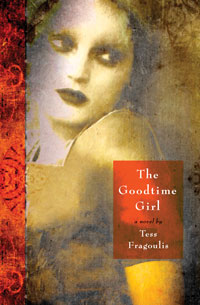Goodtime Girl goes to Greece
A seemingly mundane moment was the source of inspiration for Tess Fragoulis’s first historical fiction novel.

In 2001, she was listening to the radio while washing dishes when she first heard the soulful and gritty sound of rebetiko, a Greek music genre. This moment led her on a 10-year journey of research, writing and travel, which resulted in The Goodtime Girl (Cormorant Books, 2012).
“I never thought I would write historical fiction,” says Fragoulis, who teaches creative writing in Concordia’s Department of English. “I am not a historian or even a history lover. It was my curiosity in rebetiko that brought me to the history.”
In 1922, Smyrnean refugees flocked to Greece’s harbour cities as Smyrna (now known as Izmir in Turkey) burned. Most of the Smyrneans landed in Piraeus where poverty, crime, drugs and prostitution were rife. Emerging from its seedy underbelly was rebetiko, its lyrics celebrating the life of the mangas, Greek gangsters.
This was where Fragoulis began her story. The Goodtime Girl is set in 1922 and takes place in Smyrna and Piraeus. The story follows Kivelli, a formerly affluent young Smyrnean woman, who is stranded in Piraeus after the Great Thessaloniki Fire.
Armed only with her looks, a good singing voice and a bit of luck, she finds herself performing at a local tavern for mangas and prostitutes. Through a chance encounter with Marianthi, the wife of the great rebetiko musician The Smyrniot, Kivelli emerges as a successful performer and begins to rebuild her life.

During her research, Fragoulis noticed the female voice was absent in the history of rebetiko. “It was wall-to-wall men,” she says. “There was no mention of the great female rebetiko singers. These women were only a step above a prostitute. It was their lives, passions and desires that I was interested in.”
Soon after releasing the English version, Greek publishing house Psichogios Publications decided to publish the book in Greek. Its translation was a major success, it quickly became Psichogios’s number one e-book after its release in October 2012. Now Fragoulis has set her sights on Greece where she will be touring to promote the recently released paperback of the Greek translation.
In addition to The Goodtime Girl, Fragoulis has published a collection of short stories, Stories to Hide from Your Mother (Arsenal Pulp Press, 1997) and a novel, Ariadne’s Dream (Thistledown Press, 2001).
Stay tuned to NOW for a blog written by Fragoulis about her experience in Greece. She can be followed on Twitter @fellinigirl or on Pinterest.
Related links:
• Tess Fragoulis’s web page
• The Goodtime Girl
• The Goodtime Girl on Pinterest
• Concordia’s Department of English
• Listen to rebetiko

